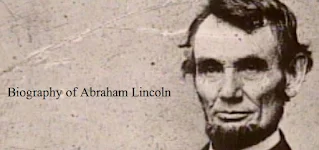Biography of Abraham Lincoln | Early Life - Career and Political Journey - Civil War and Gettysburg Address - Assassination and Legacy of Abraham Lincoln
Biography of Abraham Lincoln:
Abraham Lincoln, the 16th President of the United States, is widely regarded as one of America's greatest leaders. His leadership during a critical period in U.S. history, particularly the Civil War, and his commitment to ending slavery have left an enduring legacy.
Here is a brief biography of Abraham Lincoln:
Early Life:
Date of Birth: February 12, 1809
Place of Birth: Hardin County (now LaRue County), Kentucky, USA
Lincoln was born in a log cabin in a frontier region. His family faced economic challenges, and he had limited formal education.
 |
| Biography of Abraham Lincoln |
Lincoln's Career and Political Journey:
Lincoln worked various jobs, including as a rail-splitter and a store clerk, before studying law and becoming a self-taught lawyer.
He entered politics and served as a member of the Illinois State Legislature in the 1830s.
Lincoln was elected to the U.S. House of Representatives in 1846, serving one term from 1847 to 1849.
Lincoln-Douglas Debates:
Abraham Lincoln gained national attention during the famous Lincoln-Douglas debates of 1858 when he ran as the Republican candidate for the U.S. Senate in Illinois against the Democratic incumbent Stephen A. Douglas.
Although he lost the Senate race, Lincoln's articulate arguments against the extension of slavery raised his profile.
Abraham Lincoln in Presidential Election of 1860:
In 1860, Lincoln was elected as the first Republican president of the United States.
His victory triggered secession by Southern states, leading to the formation of the Confederate States of America and the onset of the Civil War.
Civil War:
Lincoln faced the formidable challenge of preserving the Union during the Civil War (1861-1865), a conflict primarily fought over the issues of slavery and states' rights.
He navigated the complexities of war, issued the Emancipation Proclamation in 1863, and worked towards the passage of the Thirteenth Amendment, which abolished slavery.
Gettysburg Address:
In 1863, Lincoln delivered the Gettysburg Address, a short but powerful speech that emphasized the principles of equality and democracy, defining the war as a struggle for a "new birth of freedom."
Reelection and the Thirteenth Amendment:
Lincoln was reelected in 1864 as the war continued.
The Thirteenth Amendment, abolishing slavery, was passed by Congress in January 1865 and ratified by the states later that year.
Assassination of Abraham Lincoln:
Abraham Lincoln's leadership and the Union's victory in the Civil War were overshadowed by tragedy. On April 14, 1865, he was assassinated by John Wilkes Booth while attending a play at Ford's Theatre in Washington, D.C.
Lincoln succumbed to his injuries the following day, on April 15, 1865.
Legacy:
Lincoln is remembered for his leadership, eloquence, and his efforts to preserve the Union and end slavery.
His presidency is often cited as a pivotal moment in American history, and he is an enduring symbol of leadership during times of crisis.
Abraham Lincoln's legacy is enshrined in the collective memory of the United States, and he is celebrated as one of the nation's greatest presidents.

Comments
Post a Comment